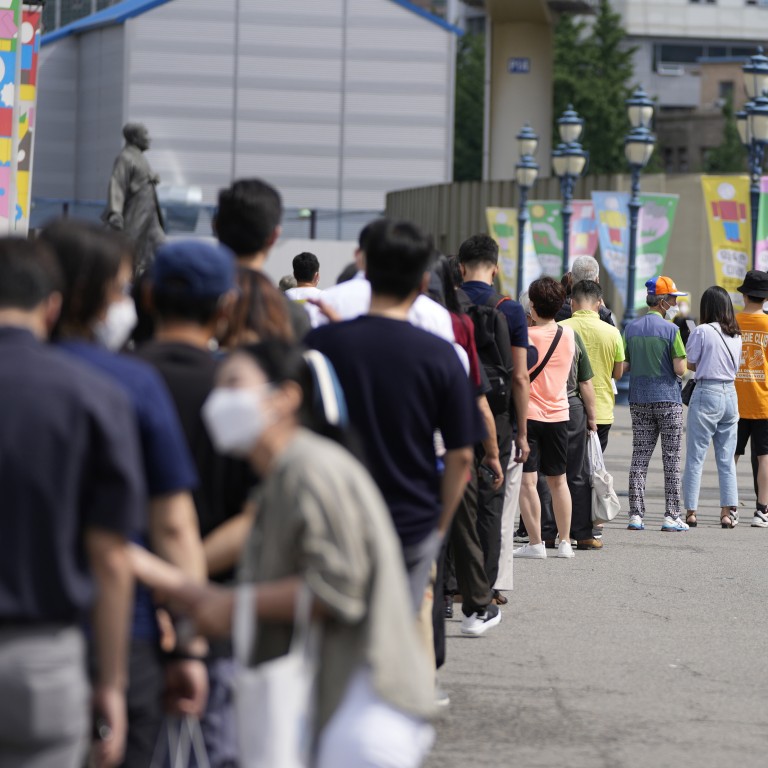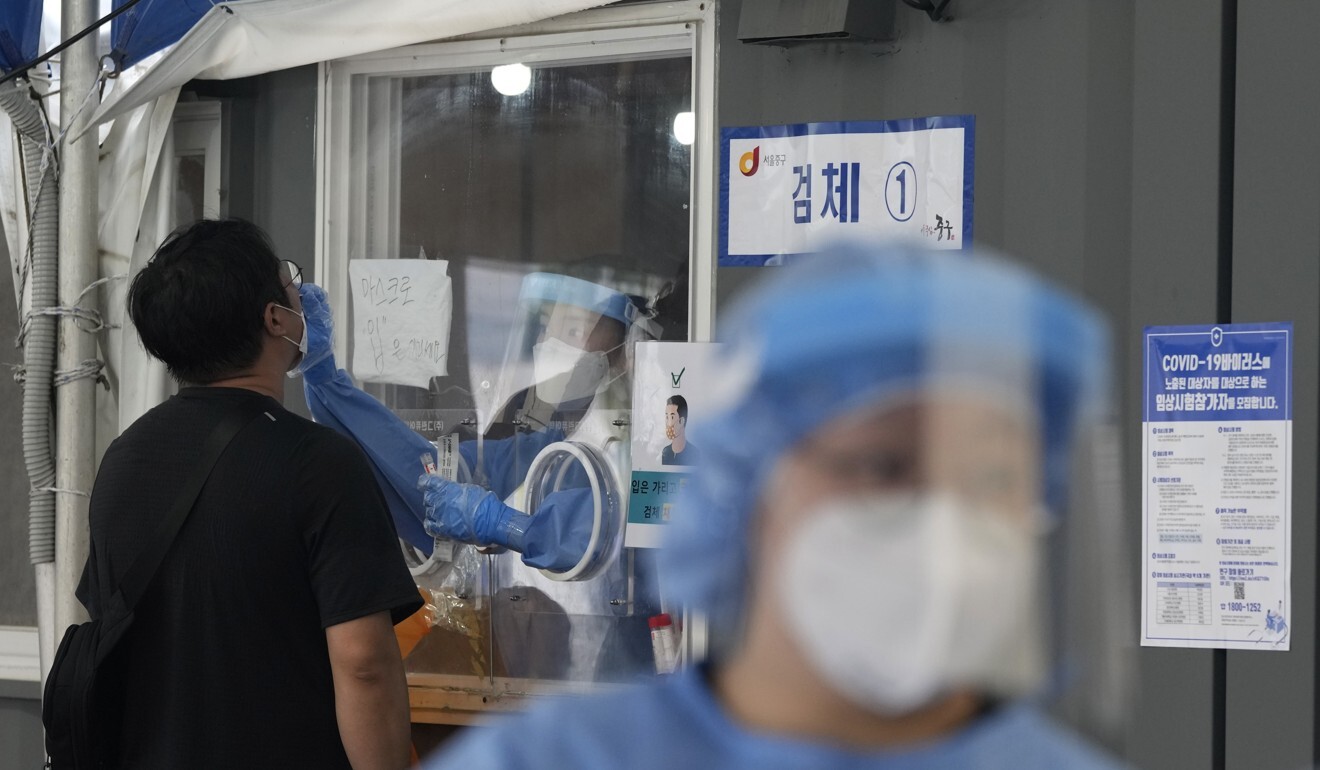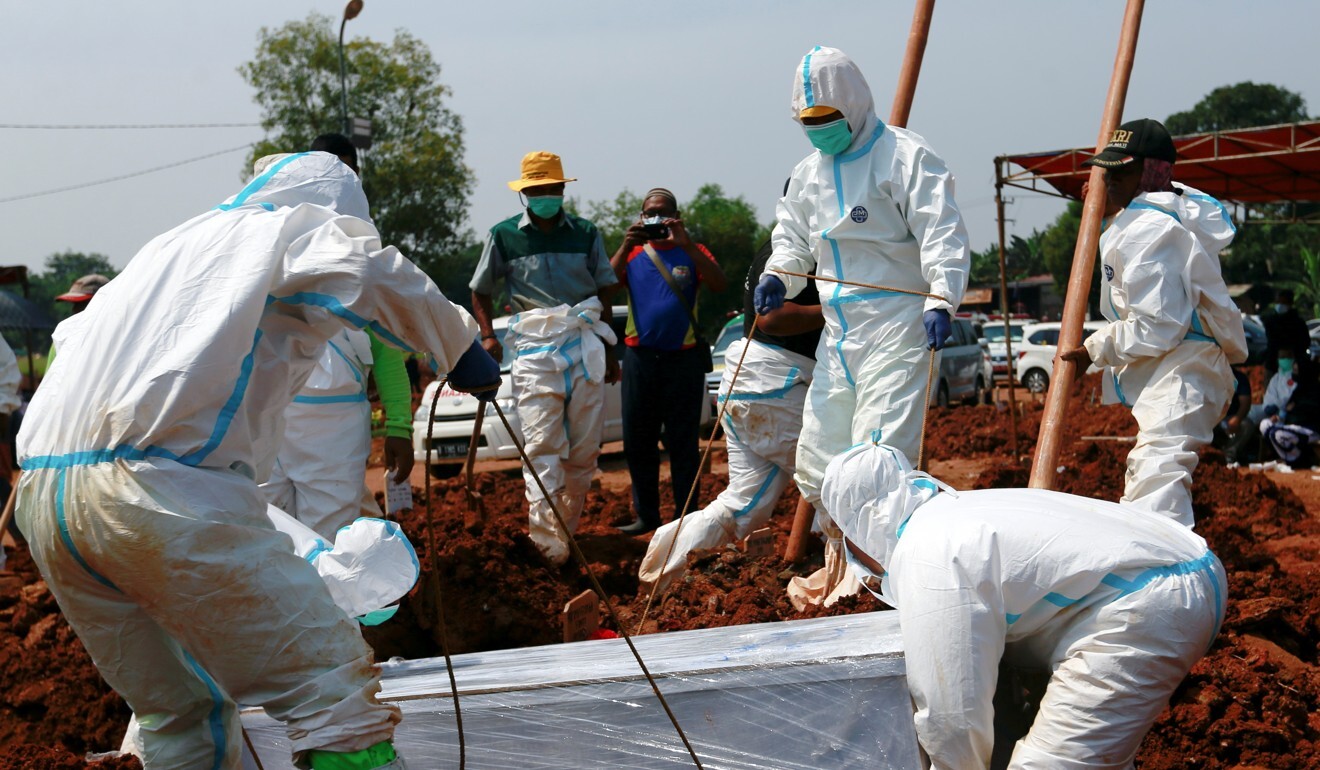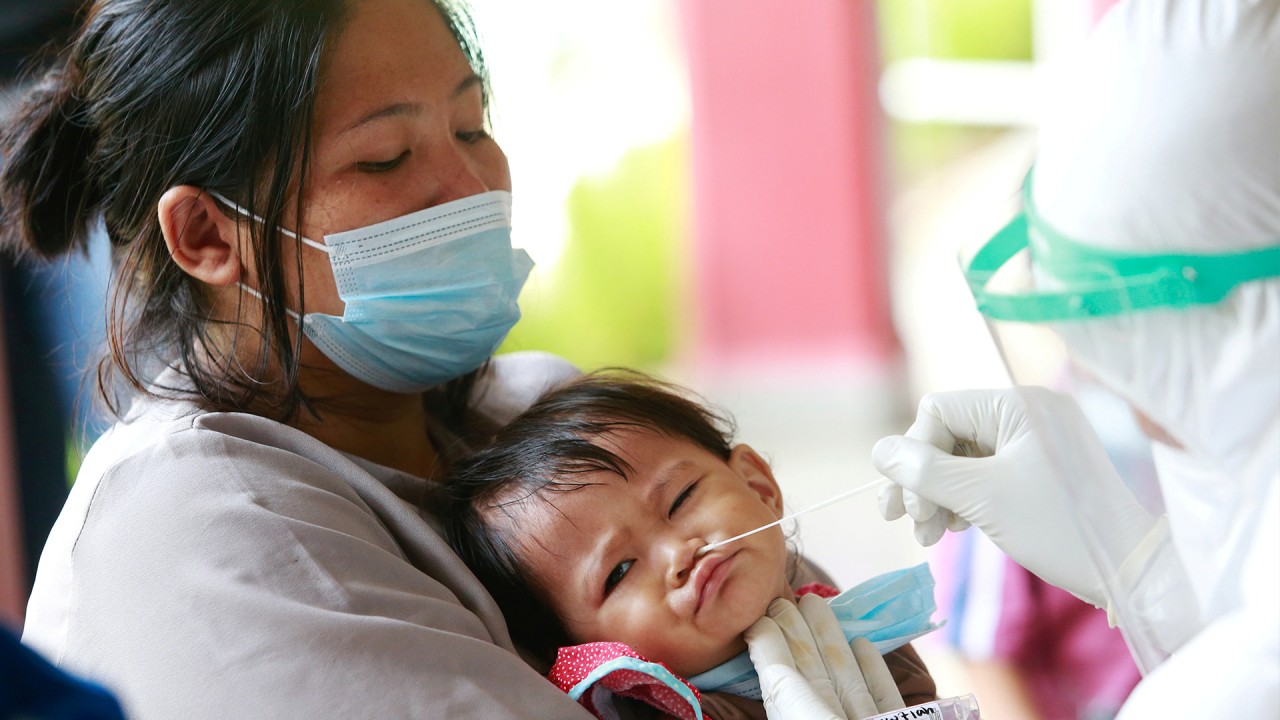
Coronavirus: South Korea logs record infections; Indonesia’s daily deaths top 1,000
- Just 10 per cent of South Korea’s population of 52 million have been fully vaccinated, while 30 per cent have received at least one shot
- Meanwhile, the lead scientist on China’s Sinovac vaccine trials in Indonesia died of suspected Covid-19, and cases surged in Australia’s New South Wales
The 1,275 cases in the 24 hours to midnight on Wednesday, reported by the Korea Disease Control and Prevention Agency, exceeds the number of daily cases reported at the peak of the country’s third wave in December.
Around 80 per cent of the 1,275 locally transmitted cases were recorded in the greater Seoul area, comprising the capital, Gyeonggi Province and Incheon city, official data showed.

Health authorities said Seoul would meet the criteria for imposing Level 4 social distancing measures with a three-day streak of new case numbers above 389, the daily average from July 1-8.
Given the city recorded 545 new cases on Wednesday and 577 on Tuesday, that requirement could be reached with Thursday’s numbers, which will be announced on Friday.
“We continue to review pre-emptive responses for the metropolitan Seoul area,” Yonhap news agency quotes health ministry official Son Young-rae as telling reporters.
Under Level 4 restrictions, people are advised to stay home as much as possible, schools are closed, public meetings are restricted to two people and rallies or other events are banned. Nightclubs and bars would be shut while restaurants and cafes would be allowed limited seating and only takeaway services after 10pm.
Prime Minister Kim Boo-kyum said the government would monitor the situation throughout the week and discuss potentially imposing higher restrictions in Seoul and other regions at a coronavirus response meeting on Sunday.
South Korea starts to reopen as Asia’s ‘zero-Covid’ economies self-isolate
Just 10 per cent of the country’s population of 52 million people have been fully vaccinated, while 30 per cent have received at least one shot, most them aged over 60. Total infections stand at 164,028, with 2,034 deaths.
Some observers say complacency among the public may have played a role in the current outbreak, given that the government had said restrictions would be eased from July as more people became vaccinated.

Indonesia’s daily Covid-19 deaths top 1,000
The nation of 270 million people on Wednesday reported 1,040 more deaths over the past 24 hours, double the number just a week ago, the latest ministry data shows. It also registered a new daily record of 38,391 cases on Thursday, plus 852 fatalities.
Southeast Asia’s biggest economy is preparing a response should daily cases hit 70,000, which would be the worst-case scenario, according to Luhut Binsar Panjaitan, who is overseeing the pandemic response in the most-populated islands of Java and Bali. The government said this week it plans to start importing oxygen to secure supplies.
The highly transmissible Delta variant now accounts for 90 per cent of active cases, Panjaitan said, adding that movement curbs in Java and Bali, where cases are surging, aim to reduce people’s mobility by 50 per cent.

05:46
‘The fear is always there’, says Indonesian doctor working on Covid-19 front line
Indonesia is considering offering a third vaccine shot to health care workers to increase their protection against the deadly virus, and the plan is pending studies by the national vaccination board and drug agency, said Siti Nadia Tarmizi, a spokeswoman for the nation’s Covid-19 task force.
Kumparan news service said Novilia Sjafri Bachtiar had died of the coronavirus. Sindonews quoted an official of state-owned pharmaceuticals company BioFarma as saying she had been buried according to Covid-19 protocols.
State enterprises minister Erick Thohir posted a message on Instagram mourning her “huge loss” at BioFarma, which is making the vaccine. He did not give the cause of her death.
BioFarma did not immediately respond to a request for comment on the death of Novilia, who was in her early fifties.
The infection and deaths of health workers in Indonesia who had received the Sinovac vaccine has added to questions over its effectiveness in preventing hospitalisation and death.
According to independent data group Lapor Covid-19, 131 health care workers, mostly vaccinated with the Sinovac shot, have died since June, including 50 in July.
Last month, Sinovac spokesman Liu Peicheng told Reuters preliminary results showed the vaccine produced a three-fold reduction in neutralising effect against the Delta variant.
Vaccines rushed to Sydney as outbreak spirals
As a citywide lockdown entered its third week, there were signs of the outbreak spiralling, with a record increase of 38 new cases in the last 24 hours.
Scott Morrison said the situation in the city was “very serious” and urged its 5 million inhabitants not to give in to fatigue and to obey stay-at-home orders.

07:07
The global spread of the highly contagious Delta variant of Covid-19
After a top New South Wales health official suggested it might be impossible to bring the outbreak under control, regional leaders threatened to cut Sydney off from the rest of the country.
The premier of Western Australia vowed to indefinitely extend a ban on travellers from the city and surrounding New South Wales “if they don’t get it under control”. “I think that’s a statement of the bleeding obvious,” Mark McGowan said.
Travel bans between states have become a regular occurrence in Australia, but the threat of closing borders until vaccines are rolled out was a marked escalation.
Around 8 per cent of Australians have been fully vaccinated – one of the lowest rates among rich nations – and widespread vaccination is not expected to be in place until the end of 2021. Since the pandemic began, the country has detected just over 30,800 virus cases and reported 910 deaths.
Malaysia deaths jump
The health ministry also reported 8,868 new infections, bringing the total number of cases in the country to 808,658.
Stay-at-home orders imposed in Vietnam’s Ho Chi Minh City
The new curbs will require residents of Ho Chi Minh City to stay at home, and venture out only for “essential needs” such as work, food, medicines, or urgent medical assistance, according to a note posted in the city’s press centre citing Mayor Nguyen Thanh Phong. The order marks the tightening of restrictions from current measures that bans operation of schools, bars, restaurants, wet markets and most public transport.
Vietnam approves Sinopharm’s vaccine, but will people take it?
Motorbike taxis, which were previously exempt from the curbs, will be kept off the roads for about two weeks from July 9, the order said. The mayor urged citizens not to resort to panic buying, while assuring them that the city has a sufficient supply of essentials to meet everyone’s needs.
Ho Chi Minh City, which extended social-distancing measures indefinitely on June 29, is now Vietnam’s worst-hit region, with 8,151 local infections during the latest wave, according to data from the health ministry.
Meanwhile, the Southeast Asian Games, due to take place in Vietnam this year, have been postponed because of the pandemic and will most likely be held in 2022, a member of the organising council said.
“Definitely, the 31st SEA games will not [be hosted] this year as scheduled in November,” said Varin Tansuphasiri, Games Council member and deputy secretary of the Thai Olympic Committee. “Vietnam wants to postpone the Games until next year, 2022.”
Vietnam reported 1,314 new cases on Thursday, bringing the national total to 24,385 since the pandemic began.
Thailand reports record daily deaths
Thailand reported on Thursday 75 new deaths from the coronavirus, a new daily record, bringing the total number of fatalities in the Southeast Asian country to 2,462 since the pandemic started last year.
The country’s Covid-19 task force also reported 7,058 new coronavirus cases, taking the total number of infections to 308,230
Police deliver groceries as cases surge in Fiji
Fiji reported a record daily increase in Covid-19 infections as it began distributing groceries to some households, urging people to stay at home amid rising infections of the highly transmissible Delta variant.
“Daily case numbers are expected to continue to increase, along with an increase in people with Covid-19 requiring hospitalisation, and sadly, more deaths,” the Ministry of Health said in a statement.
Since the pandemic began, the country of less than a million people has reported 42 deaths, 40 of which have come since the emergence of the Delta variant in April and case numbers have risen markedly.
The worse it gets, the bigger the warning sign for other Pacific countries about the desperate need at this stage to prepare for what could happen
Police and a supermarket “delivered household packs to Fijians in targeted lockdown areas and home isolation”, the government said on Twitter as part of a publicity blitz on Covid-19 safety.
Kate Greenwood, head of the Pacific delegation for the International Federation of Red Cross and Red Crescent Societies, said relative to population size, Fiji had been hit harder by the virus than India at the height of its outbreak.
“The worse it gets, the bigger the warning sign for other Pacific countries about the desperate need at this stage to prepare for what could happen,” she said by telephone from Suva. “There’s a strain on the health system as all resources attempt to cope, from the hospitals to the blood service to the mortuaries.”
Outbreaks hit Myanmar jails
A spokesman Insein jail in Yangon did not answer calls from Reuters seeking comment on the report.
Authorities at the colonial-era jail have stopped sending prisoners to attend court hearings either at a special facility inside the jail or to courts in the city, Zayar Lwin, an activist and former political prisoner who was freed from Insein in April, said.
The BBC report said authorities at jails in other parts of the country, including in Myaungmya and Taungoo, were also taking action to contain the spread of the virus.
The Southeast Asian nation is in the midst of its most serious wave of infections to date, and efforts to manage the crisis have been hampered as the country descended into chaos after the military overthrew a democratically elected civilian government on February 1.
Many prisoners in Insein jail became sick and some died earlier during the pandemic, but there was little virus testing for prisoners, Zaya Lwin said.
“I don’t know about whether they are now testing the prisoners who are inside or not,” he said.
In a bid to contain Covid-19, stay at home orders have been issued for parts of Yangon as well in Chin state and in the Sagaing region, the state Myanmar News Agency reported.
Myanmar recorded 3,947 new cases on Wednesday, up sharply from an average daily case number of around 60 in late May and bringing total infections to 175,923, according to health ministry data. The death toll rose by 57 to 3,570.
Reporting by Reuters, Kyodo, Agence France-Presse, Bloomberg
